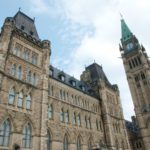Many Christians are probably undisturbed by the Quebec government’s recently-unveiled legislation restricting religious imagery in the civil service. Once passed, Bill 21 will make it illegal for certain public employees in Quebec to wear religious symbols while on the job. Though the new law will prohibit civil servants from wearing Christian emblems such as crosses, some believe that its provisions are meant to primarily target religious minorities who wear head and face coverings, in particular members of the Muslim faith.
There are, no doubt, some Christians who will accordingly welcome Bill 21 as a positive step toward restricting Islamic influence in the civil service. This, however, would be a mistake. Not only is the Quebec religious symbol ban inconsistent with Canadian constitutional principles, it’s fundamentally incompatible with a Biblical understanding of what the role of the government is vis-à-vis religion.
The core message of Bill 21 is that religion is not welcome in the public square. It says to public servants that their faith-based identity must be divorced from their professional identity. It says that members of minority religious groups can be denied the right to participate in public life as equal citizens. And it says that the state is entitled to restrict religious expression in the name of religious neutrality and secularism.
The Biblical Limits of Human Authority
The underlying objective of Bill 21 is contrary to what scripture teaches about the limits of human authority. God declared to Noah in Genesis 9:6 that “[w]hoever sheds the blood of man, by man shall his blood be shed, for God made man in his own image.” In making this covenant, God equipped humans – and, by extension, human governments – to promote equity and justice amongst his divine image-bearers.
Yet this does not mean that the covenantal authority which the state now wields is limitless. Although God has conferred governments with the power to “carry out [his] wrath on the wrongdoer” (Romans 13:4), he hasn’t given them the jurisdiction to decide what constitutes pure and undefiled religion.
As Jonathan Leeman explains, the Noahic Covenant demonstrates that God is deeply concerned with human political affairs, but that he has not empowered state actors to police idolatry or heresy. “The state and its citizens must tolerate the worship of those gods whom one does not acknowledge,” Leeman writes, “at least until those gods do harm to oneself or one’s neighbor.”
The Religious Neutrality of the State
This view toward Biblically-prescribed governance is hardly new. John Calvin, as but one of many examples, was adamant that Christians should not “commit to civil governments the duty of rightly establishing religion” since scripture does not permit the state to “make laws according to their own decision concerning religion and the worship of God.” At least to some extent, the state must remain outwardly neutral in its treatment of different religious groups.
Admittedly, the idea that governments can be religiously neutral is somewhat pretentious. The state cannot pursue an amoral vision of justice and equality. Every political position that we adopt depends on a certain understanding of our obligations toward God and our fellow image-bearers. As Leeman thus explains, “[t]he public square is nothing more or less than a battleground of gods, each vying to push the levels of power in its favor”, which consequently means that “there are no truly secular states, only pluralistic ones.”
In this way, Bill 21 is anything but neutral. By seeking to remove religious imagery from the public service, the Quebec government is denying religious adherents a meaningful role in public life and further entrenching its status as an explicitly irreligious state. This deviation from the jurisdictional limits which God has placed on human authority ought to distress Christians, even if we aren’t the primary target of this particular piece of legislation.






















